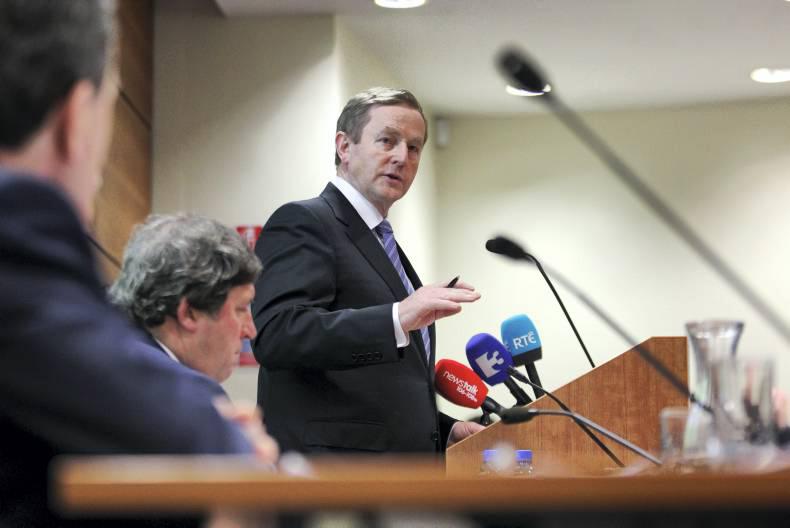The Taoiseach promised support for beef and sheep farmers if his government was returned to power, but he added that meeting the IFA's demands for a €200/cow suckler premium and €20/ewe payment would require "budgetary decisions" that he did not commit to.
He also said there would be "flexibility" in the management of applications under the TAMS scheme to take account of difficulties caused by recent flooding.
IFA National Chairman Jer Bergin said the interaction between members of the Council and the Taoiseach was a valuable exercise in putting IFA’s election submission before Enda Kenny ahead of the start of the general election.
Watch a video of Jer Bergin's introduction and Enda Kenny's address as streamed live by the Irish Farmers Journal on Periscope this Thursday.
The IFA submission sets out the main policy issues to be addressed in each commodity sector and deals with various cross-sectoral issues. It also looks at wider issues affecting farm families and rural communities in regard to rural services and infrastructure, social policy and farm safety.
Bergin said farmers need to see tangible measures taken by the government including:
Annual expenditure of €580m (national and EU) for farm schemes, including the restoration of cuts to payment rates for disadvantaged areas and €250m allocation for GLAS;Stronger EU CAP budget and supports;Increased supports for low-income sectors and vulnerable regions, including targeted payments of €200 per suckler cow and €20 per ewe;Effective measures to redress the balance of power in the food supply chain and ensure fair and viable commodity prices for farmers;Real delivery for farmers from access to new export markets;Improved services and infrastructure for rural IrelandBergin said the IFA will "work to ensure that politicians and political parties establish policies that promise a real and positive impact on agriculture and rural Ireland. We expect firm commitments from all parties that they will undertake actions to support agriculture, put the sustainable and profitable growth of family farming to the fore and prioritise the rejuvenation of rural Ireland as an essential element of economic recovery."
During the general election campaign, the IFA county executives will be meeting the candidates at constituency level to discuss the agenda. At national level, IFA will be engaging with the party leaders and agriculture spokespersons.
The Taoiseach promised support for beef and sheep farmers if his government was returned to power, but he added that meeting the IFA's demands for a €200/cow suckler premium and €20/ewe payment would require "budgetary decisions" that he did not commit to.
He also said there would be "flexibility" in the management of applications under the TAMS scheme to take account of difficulties caused by recent flooding.
IFA National Chairman Jer Bergin said the interaction between members of the Council and the Taoiseach was a valuable exercise in putting IFA’s election submission before Enda Kenny ahead of the start of the general election.
Watch a video of Jer Bergin's introduction and Enda Kenny's address as streamed live by the Irish Farmers Journal on Periscope this Thursday.
The IFA submission sets out the main policy issues to be addressed in each commodity sector and deals with various cross-sectoral issues. It also looks at wider issues affecting farm families and rural communities in regard to rural services and infrastructure, social policy and farm safety.
Bergin said farmers need to see tangible measures taken by the government including:
Annual expenditure of €580m (national and EU) for farm schemes, including the restoration of cuts to payment rates for disadvantaged areas and €250m allocation for GLAS;Stronger EU CAP budget and supports;Increased supports for low-income sectors and vulnerable regions, including targeted payments of €200 per suckler cow and €20 per ewe;Effective measures to redress the balance of power in the food supply chain and ensure fair and viable commodity prices for farmers;Real delivery for farmers from access to new export markets;Improved services and infrastructure for rural IrelandBergin said the IFA will "work to ensure that politicians and political parties establish policies that promise a real and positive impact on agriculture and rural Ireland. We expect firm commitments from all parties that they will undertake actions to support agriculture, put the sustainable and profitable growth of family farming to the fore and prioritise the rejuvenation of rural Ireland as an essential element of economic recovery."
During the general election campaign, the IFA county executives will be meeting the candidates at constituency level to discuss the agenda. At national level, IFA will be engaging with the party leaders and agriculture spokespersons.






 This is a subscriber-only article
This is a subscriber-only article















SHARING OPTIONS: